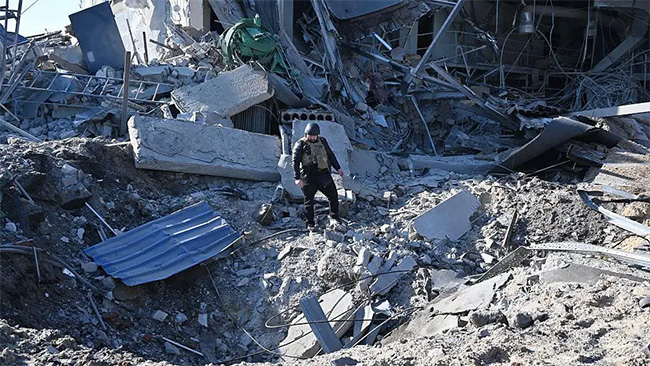Ukrainian President Volodymyr Zelensky has accused Russia of creating the “sense” of a ceasefire while still carrying out military operations in some parts of Ukraine.
In the first six hours of the “Easter truce” ordered by Russian President Vladimir Putin – Russian forces carried out 387 shelling and 19 strikes and used 290 drones, Zelensky said. There were no reports of casualties.
Putin ordered his forces to “cease all military activity” in Ukraine from 18:00 Moscow time (16:00 BST) on Saturday until midnight on Sunday. Kiev also said it would comply.
The BBC in Ukraine reports that it has been quiet on the front lines.
Putin’s ceasefire was announced minutes before it was due to take effect but has remained quiet, so an immediate, complete ceasefire has always been impossible.
Zelensky said there had been continued attacks in some areas, but there had been no reports of Russian drones or fighter jets in Ukrainian skies by midnight on Saturday.
That was very rare.
The only report was that a Russian ship with missile launchers had been deployed to the Black Sea.
It was quiet in the southern city of Odessa. On Friday, before Moscow’s announcement, air defences were put on alert overnight as Russian drones flew towards occupied Crimea.
On Sunday morning, Zelensky said that Moscow was “trying to create a general sense of a ceasefire, but in some places it does not abandon individual attempts to advance into Ukraine and inflict losses.”
Accusing Russia of specific military actions, Zelensky said: “Everywhere our warriors are responding to the enemy appropriately, depending on the specific combat situation.”
Late on Saturday — hours after the ceasefire — Zelensky said: “If Russia is now suddenly ready to join a model of complete and unconditional silence, Ukraine will act accordingly — mirroring Russia’s actions.”
“Our actions are and will be symmetrical. The proposal for a complete and unconditional 30-day silence is on the table — the answer to it must come from Moscow,” he wrote in X.
Zelensky said Ukraine was ready to extend a ceasefire beyond April 20, referring to an earlier proposal from the United States for a 30-day ceasefire that Ukraine had already agreed to.
Now it seems that Washington needs to show that both Moscow and Kiev are serious about peace. The question of whether the Kremlin will accept Zelensky’s proposal to extend the ceasefire from 30 hours to 30 days is central to any potential path to peace.
Few Ukrainians think it can be done remotely.
Putin announced the temporary ceasefire during a meeting with his chief of the general staff, Valery Gerasimov.
“Based on humanitarian considerations… the Russian side announces an Easter ceasefire. I order the cessation of all military activity for this period,” Putin told Gerasimov.
“We assume that Ukraine will follow our example. At the same time, our forces must be ready to counter any ceasefire violations and any aggressive actions by the enemy.”
The Russian Defense Ministry said that Ukraine would adhere to its military ceasefire “if they respect each other.”
This is not the first time that a ceasefire has been abruptly declared – a previous attempt at a ceasefire during Orthodox Christmas in January 2023 collapsed after both sides could not agree on a proposal.
Responding to Putin’s ceasefire announcement, a UK Foreign Office spokesman said:
“It is now time for the Ukrainian government to really show that it is serious about peace, not just by taking a one-day break for Easter, but by, as requested, ending its horrific aggression and committing to a full ceasefire.”
Russia launched a full-scale invasion of Ukraine on February 24, 2022. Hundreds of thousands of people on all sides — the vast majority of them soldiers — are estimated to have been killed or wounded.
The United States has been talking directly with Russia as part of efforts to end the war in Ukraine, but has struggled to make much progress.
Last month, Moscow rejected a proposal for a full and unconditional ceasefire agreed to by the United States and Ukraine.
On Friday, U.S. President Donald Trump warned that Washington would “seek permission” to continue talks on ending the war in Ukraine if there was no quick progress.
He spoke after Secretary of State Marco Rubio said the United States “will not continue this effort for weeks and months” because it had “other priorities to focus on.”
“We have to decide very quickly now – I’m talking a few days – whether this can be done or not,” he added.
“If it doesn’t happen, we’ll move on.”





